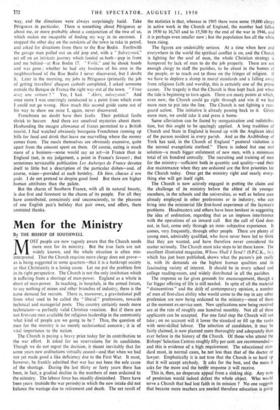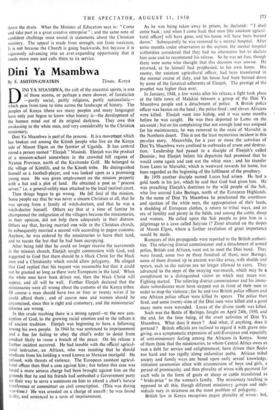Men for the Min istry By THE BISHOP OF SOUTHWELL M OST
people are now vaguely aware that the Church needs more men for its ministry. But the true facts are not widely known, and the whole situation is often mis- interpreted. That the Church requires more clergy does not prove— as is being suggested in some quarters—that it is a bankrupt society or that Christianity is a losing cause. Let me put the problem first in its right perspective. The Church is not the only institution which is suffering from a shortage of man-power. England as a whole is short of man-power. In teaching, in hospitals, in the armed forces, to say nothing of mines and other branches of industry, there is the same demand for recruits. There is, moreover, a gravitational pull from what used to be called the " liberal " professions, towards technical and managerial posts. This country certainly needs more technicians—a perfectly valid Christian vocation. But if there are not first-rate men available for religious leadership in the community what kind of people are we going to be ? Thus, the question of men for the ministry is no merely ecclesiastical concern ; it is of vital importance to the nation.
The Church is paying a heavy price today for its contribution to the war effort. It asked for no reservations for its candidates. Though we do not regret the decision, it Leant inevitably that for some years new ordinations virtually ceased—and that when we had not yet made good a like deficiency due to the First War. It must, however, be frankly admitted that war has not been the sole cause of the shortage. During the last thirty Or forty years there has been, in fact, a gradual decline in the numbers of men ordained to the ministry. The labour force has steadily diminished. There have been years (outside the war periods) in which the new intake did not balance the wastage due to retirement and death. The net result of the statistics is that, whereas in 1905 there were some 19,000 clergy in active work in the Church of England, the number had fallen in 1930 to 16,745 and to 15,500 by the end of the war in 1946, and it is perhaps even smaller now ; but the population has all the while been rising.
The figures are undeniably serious. At a time when here and everywhere in the world the spiritual conflict is on, and the Church is fighting for the soul of man, the whole Christian strategy is hampered by lack of men to do the job properly. There are not enough clergy to staff the parishes, to be about in the homes of the people, or to reach out to those on the fringes of religion. If we have to deplore a slump in moral standards and a falling away from religious faith and worship, this is certainly one of the prime causes. The tragedy is that the Church is thus kept back just when the tide is beginning to turn again. There are many points at which, even now, the Church could go right through and win if we had more men to put into the line. The Church is not fighting a rear- guard action. The initiative is already passing back to it. Given more men, we could take it and press it home.
Some alleviation can be fopnd by reorganisation and redistribu- tion, but this ought to be sparingly applied. A long tradition of Church and State in England is bound up with the Anglican ideal of the parson resident in.every parish. And as the Archbishop of York has said, in the Church of England " pastoral visitation is the normal evangelistic method." There is indeed but one real solution—a much bigger enlistment of new men, with a minimum total of six hundred annually. The recruiting and training of men for the ministry—sufficient both in quantity and quality—and their due maintenance when they are ordained are the first priorities for the Church today. Once get the ministry right and nearly every- thing else will get itself right.
The Church is now actively engaged in putting the claim and the challenge of its ministry before the ablest of its younger members, in the schools and the universities, as well as before men already employed in other professions or in industry, who can bring into the ministerial life first-hand experience of the layman's problems. Headmasters and others have been hesitant in suggesting the idea of ordination, regarding that as an impious interference with the operations of an inward call. But the call of God does not, in fact, come only through an inner subjective experience. It comes, very frequently, through other people. There are plenty of young men, admirably qualified, who have never been led to think that they are wanted, and have therefore never considered the matter seriously. The Church must take steps to let them know. The excellent illustrated magazine, Whom Shall 1 Send ? (S.P.C.K., ls.), which has just been published, shows what the parson's job really is, with its demands on the highest human qualities and its fascinating variety of interest. It should be in every school and college reading-room, and widely distributed in all the parishes.
The response so far gives grounds for encouragement, though a far bigger offering of life is still needed. In spite of all the material " disincentives " and the drift of contemporary opinion, a number of men of first-class ability who would come to the top in any other profession are now being ordained to the ministry—most of them at the moment ex-service men. New applications now being received are, at the rate of roughly one hundred monthly. Not all of these applicants can be accepted. For one fatal step the Church will not take ; on no account will it lower the standard or fill up the ranks with semi-skilled labour. The -selection of candidates, it, may be fairly claimed, is now planned more thoroughly and adequately than ever before in the history of the Church. Of those who attend the Bishops' Selection Centres roughly fifty per cent. are recommended— and this is evidence of a high requirement. The educational stan- dard must, in normal cases, be not less than that of the doctor or lawyer. Emphatically it is not true that the Church is so hard up that it will accept anybody. It asks for the best, and the more it asks for the more and the bet& response it will receive.
This is, then, no desperate appeal from a sinking ship. Any note of pessimism would indeed defeat the whole object. Who would serve a Church that had lost faith in its mission ? No one suggests that because more teachers are needed therefore education is going down the drain. What the Minister pf Education says is: "Come and take part in a great creative enterprise " ; and the same note of confident challenge must sound in statements about the Christian ministry. The appeal is made from strength, not from weakness. It is not because the Church is going backwards, but because it is vigorously advancing into an ever-expanding opportunity that it needs more men and calls them to its service.



































 Previous page
Previous page